#tdp meta
Text
Gift Giving & Primal vs First Elves :: Or Going Off Into the Deep Lore Deep End
Remember that meta I compiled about Greek mythology, deceptive gift giving, and TDP? Yeah it's time to talk about the gift motif properly as well as some other deep lore things because these excellent thoughts ( @spicyviren, @kradogsrats, and @its-leethee) got the wheels in my brain spinning.
AKA an unknown amount of sectioned word vomit into the nature of magic, where it comes from, how deep magic operates, some gifts and motifs, and Leola, just a little.
Let's go.
Gift Motif
The gift motif is one that's a bit of a slowburn in TDP. While characters will often pass and hand over objects — tools, artefacts, metaphorical responsibilities or trust (handing over the egg, for example) — to one another, there's not a big emphasis on gifts in the first three seasons.
There are some, such as Callum's letter from Harrow (that he's given by Claudia once again initially as a goodbye), Ezran giving Bait to Barius in S3, and Rayla's family pendant, but most of these, as you've might already noticed, are contextualized within Goodbyes. Whether the gift motif will amount in arc 2 to escaping this "final gift" context remains to be seen, but that's how it tends to work in interpersonal relationships.
There is an element of peace offering in hoping that returning Zym — a gift and/or gesture of good will — will help usher in peace, but I think (as of now at least) that ties further into the series' theme of Reciprocal Exchange (the assassin mission being an eye for an eye vs olive branch for olive branch) than outright gift giving. (Although we will probably talk about Exchange and gift giving at some point because there is also a thematic tether there.)
However, there is one other thing that is more and more often referred to as a gift in Arc 1, and that's Magic. Specifically, dark magic.
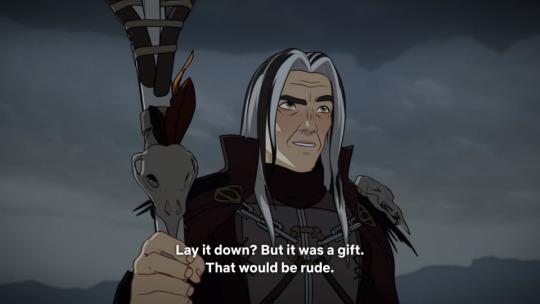
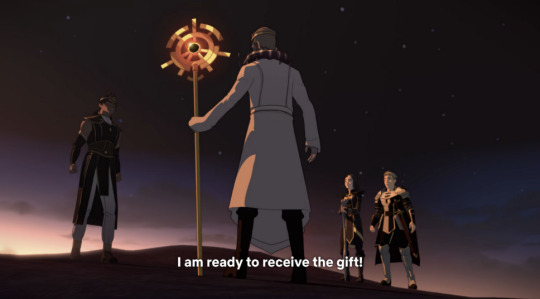
Now, this actually isn't that dissimilar from what the Goodbye gifts amount to, either. In Harrow's letter, he gifts Callum the Key of Aaravos believing it to be a powerful magical relic of some kind; Rayla's pendant makes its way from Ethari to her to Callum, who then uses it for magical purposes; and Bait, as a glow toad, is connected to an arcanum himself.
I do think it's noteworthy though that in Arc 1, (dark) magic being a gift is emphasized upon, specifically because of these lines for Khessa:
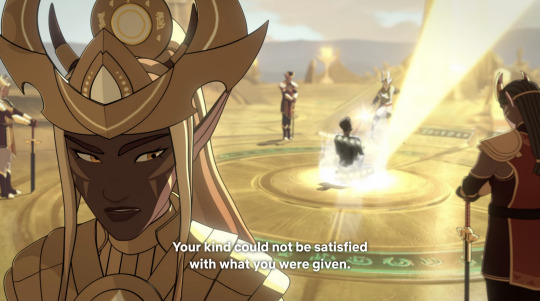
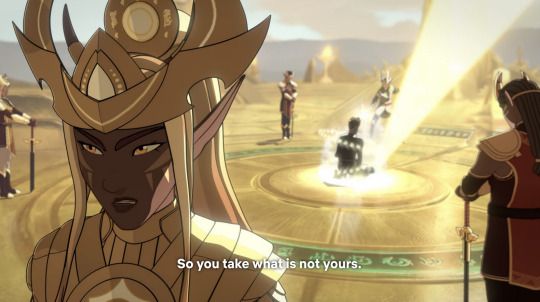
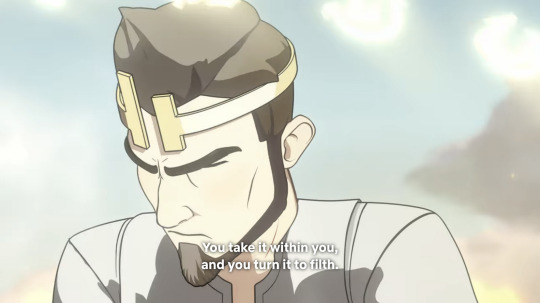
Upon first watching it back in 2019, it made sense that dark magic would be referred to this way, even when I just thought maybe it was that humans had been given 'nothing,' as Claudia says. Dark magic is closely tied to ideas of theft and thievery — stealing magic from others to harness its power for yourself — and the series is deeply interested in concepts of ownership or who has 'true' ownership over something, in magic, a throne/crown, a price to pay, etc. This follows neatly into Arc 2 (for ex: why Karim seeking to steal the Sun Seed is a metaphorical dark path even if it didn't outright involve dark magic through Kim'Dael), which we'll build on later.
That said, given the depth of the knowledge at the Great Bookery that is open to Sunfire elves more than any other type of elf, and the information that Tales of Xadia and Ripples gives us...
While elves warned that if humans were meant to wield magic they would have been born with it, [Leola] gifted the wisest humans with secrets: the language of the dragons and the runes that shaped spells. With the unicorn’s gift, the most determined minds among the humans could finally harness primal magic.
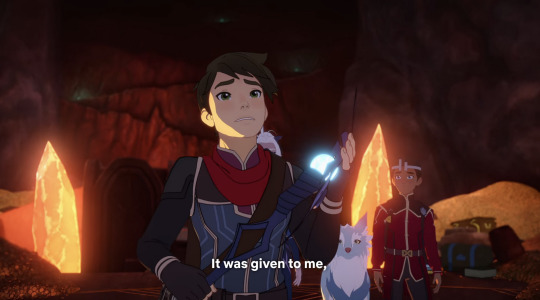
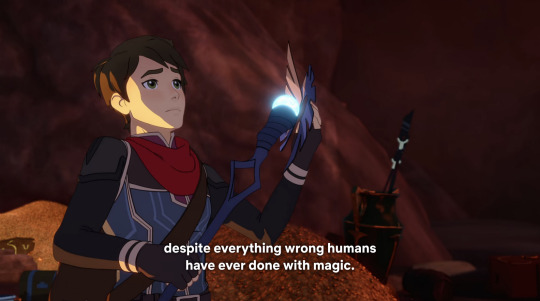
It happened long ago, when humans had only just learned to hold fire in their hands without burning. They nurtured their precious primal flames secretly—in the dark of night, beneath shadows and shrouds—as cultivating its glow drew the eyes and ire of monsters [...] Humanity had been given something it was never meant to have. And so there came a calamity.
It makes it more than likely than, unlike other elves such as Lujanne or Ibis, Khessa had reason to believe/know that there used to be primal human mages in the past... and that it wasn't 'enough' for them ultimately, because they still hungered and developed (and were given?) dark magic. "Your kind could not be satisfied with what you were given" was about the rejection of primal magic from Leola (the unicorns) in favour of a darker kind that involves theft and "dirtying yourself" (5x08) with dark magic.
But at the same time, this complicates the Gift Giving motif of including not just dark magic, but being also for primal magic — for humans, at least.
And also for elves. (Ignoring how "great orb" is very similar to "great one" for now.)
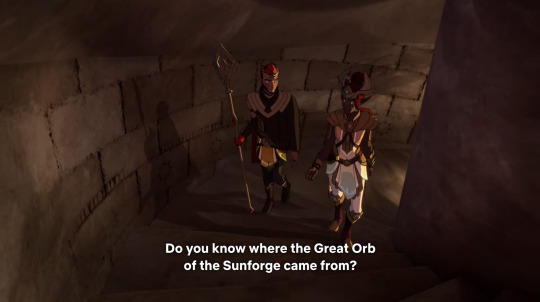
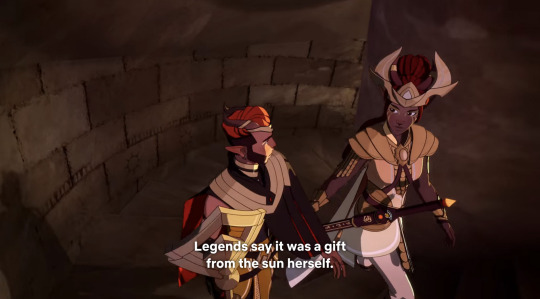
Janai: It was a gift. But there's more to it than that. The great orb began as this.
Karim: This is... a sun seed?
Now, the Great Orb being grown from a Sun 'literal' seed makes sense. We've known for a long time that in Xadia, "magic is everywhere. It's just part of the vibrance or spirit of things" (1x05). Primal magic naturally occurring in plants, animals, and elves likewise makes sense on that note. Just as not "many could bear the gruelling path of a rune mage," Karim cannot bear to have patience and faith in something that will only come to fruition centuries later.
That said, I raise the question: how functionally different is the Great Orb from say, a sun primal stone would hypothetically be? If primal stones and primal magic were gifts to humanity from unicorns — from creatures connected to the Star arcanum, for lack of a better understanding — then why not magic from Startouch (?) elves to other elves.
How do we know that all magic isn't simply a gift that was given once upon a time?
From the First Elves to the Primal Elves.
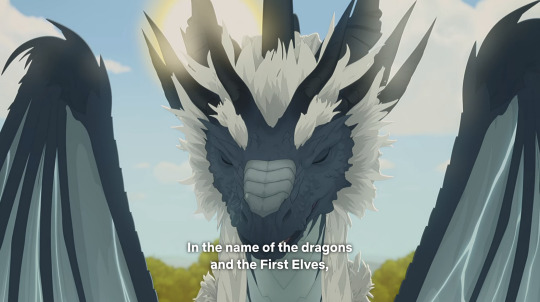
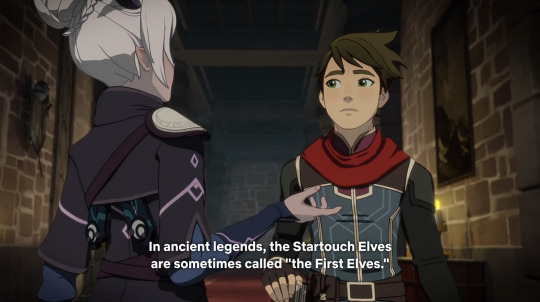
Primal vs First Elves
So what's the difference between First Elves and Primal elves?
Well we have a few pieces of lore:
1) Zubeia's status as a "heavenly majesty" (which we'll come back to in the next section) gives her authority to speak in the name of the first elves, who are effectively gods to humankind and/or Xadians ("Have our Gods died? / Where do the fabled Great Ones hide?" —the Epic of the Void
2) It seems that the First Elves are, as of now and for a while, exclusively in reference to what would otherwise be called Startouch elves, although the latter is seemingly a name that came later given Rayla's affirmation of "ancient legends". This is reaffirmed in Tales of Xadia's two lone mention of First Elves:
No group of elves presents a greater mystery than the Startouch elves. Sometimes called the First Elves, those bound to the Star primal are rumored to have made great marks on Xadia’s ancient history—but beyond story and legend, little real evidence is left to us today [...] Among the few extant records of Startouch elves are the Scrolls of the First Elves, now kept in the Great Bookery of Lux Aurea.
3) At a post-S2 con in 2019 (how's that for a far reach?) we got a timeline of the events of Xadia laid out for us. The description of the very first piece of history and era we know of goes as follows, with the Rise of Elarion happening 2000 years ago re: the Dragon Prince era ("The Return of Aaravos"):
The Era of the First elves is the first recorded era 5,000 years prior to the current era. Dragons and elves were not allied during this period. There were no distinct primal elves. This is an era before all that. Humans suffered during this period.
—2019 con timeline
4) Justin and Aaron reaffirm this at the 2:30 ish minute mark of this video (a couple of months before even S3 was released) by reaffirming distinctly to Primal elves. Later (7:40-ish mark) we see this distinction reaffirmed again through the statement of, "The patterns have been that these primal based elves have grown cultures and civilizations that have become separate and differentiated from kind of whatever the early days were with the First elves were."
Okay, so there was 100% a time where there were only First Elves, and humans, and Primal elves as we knew them (maybe still with the hands and horns, but no arcanum? Or no singular, distinct arcanum) didn't exist. Why does this matter?
This is where the deep lore timeline gets tricky, as we don't know precisely when 1) humans received magic and 2) at what stage the First Elves / Great Ones / Startouch elves 'left' Xadia, only that they did, apparently, when Elarion (the human city) needed help: "Elarion, unworthy whelp / Wept as the stars turned black the sky / They donned their masks / They turned their backs / And left Elarion to die". Why abandon the city (beyond indifference/cruelty as Aaravos would likely claim), who knows.
However, we can assume the timeline looks something like this:
Era of the First Elves
Primal elves (and presumably archdragons *) are crafted / develop into being, whatever that means
Humans are magic-less and are having a bad time
Unicorns / Leola extend sympathy despite the fact that the First Elves tell her not to (Book One: Novelization / Tales of Xadia)
Humans have primal magic (Ripples / Tales of Xadia)
This attracts negative attention, consolidated in Elarion ("the stars she asked their light to cast / and stop the dragons’ fiery might" / "as cultivating its glow drew the eyes and ire of monsters. Eventually, for the audacity of their fire, they were hunted")
Elarion asks for help and the Stars leave
Aaravos, the last star — presumably already Fallen from the First Elves — gives them dark magic under the guise of protection even though it will inevitably help him (i.e. give him the ability to possess people)
Dark magic replaces primal magic as the primary form for humans
Tension and violence escalates (unicorns are hunted to near extinction). Sol Regem is removed as King of the Dragons
Under Dragon Queen Luna Tenebris, the daughter of an elven leader suggests the Judgement of the Half-Moon, causing for humans to be banished rather than eradicated, and the continent split in two
Again, nothing too crazy / not too much we haven't already known or guessed at for a while.
But like I said, I'm gonna propose two theories, so bear with me:
Theory #1: What is Deep Magic?
The First Elves engaged with what we're gonna call Deep or Old Magic, for lack of a better term. There can be an assumption at times that this magic would be more 'pure' or less 'diluted' than dark magic or even the primal magic we've seen on screen. However, I think that's less than likely. Dark magic is often times a bad path for good outcomes, and primal magic can be a 'good' magic for bad outcomes (the blood freezing spell, for example).
While dark magic is a more textually malevolent magic system and primal magic is more true neutral — able to be used as a tool and a source of connection for the user — I don't think this necessarily means that Deep Magic is inherently enlightening (we see with the Ocean arcanum and S5 that knowledge can be an immense burden) or that it's on the opposite end of the spectrum and is outright benevolent.
What, then, am I suggesting Deep Magic to be? Well, we have some clues likewise from the same old interview post-s2 that we haven't had much basis to (potentially) understand until now, in which it's stated:
Deeper magic and deeper gifts that the original beings received [...] practical, usable, powerful magic is drawn from the six primal sources, right? But there is this idea that there's this earlier, less differentiated power kind of magic that's deeper and more - I don't kind of want to say what all of them are. It's not that important now, it has more to do with the history of beings and their interactions with each other. But Aaravos cares about some of this stuff. The best I can say is that one of them's Power — but well, what does that mean?
The six primal sources — potentially just five (hence why only 5 gemstones seem to occur naturally in nature, and Star seemingly doesn't) — are all based around physical, somewhat tangible principles. Earth, Ocean, Sun (fire/light), Sky (wind/weather) are perhaps the most tangible, with only Moon dipping into something into something more metaphysical: illusions and questioning the nature of reality, the nature of death, etc. However, I'd argue that the Moon arcanum's emphasis on death still makes it something that is particularly important to creatures who are mortal (but more on that later).
What I am arguing for is then, therefore, that Deep Magic is magic drawn from Concepts and Ideas > tangible things found in nature or parts of other magical creatures.
Three concepts, to be exact: (translated dark magic screenshot from Cartoon Universe spells reversed).
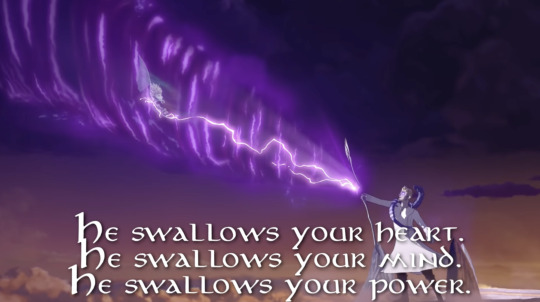
Zubeia: He chose as his instruments those who had strong hearts and strong minds, but who had an insatiable thirst and fascination with magic (power).
Three quasar diamonds, three deep magic concepts. Heart, Mind, Power.
("To know something truly and deeply, you must know it with your head, hand, and heart. Mind, body, and spirit." / "She laid before me her scales, her blindfold, and her sword, and told me to choose.")
Now, I don't know if it's these three concepts exactly — I could Truth, or Justice, or something like that — or even if it's three. But given what little we know about Deep magic thus far and how much the series' likes its threes, I think that's the likeliest number and combination.
We've known for a while that there's something weird with the connection between dark magic, spells that use blood, and 'star' magic. We know it's unlikely that Aaravos being able to possess people who have used dark magic was just a happy accident discovered after humans started using it. We know that when Callum is offered the dark magic version of the cube in his dreams, the symbol is blood red: "You can have unlimited power." And that dark magic "became the key that unlocked a place of power for humans in Xadia" (Tales of Xadia).
So what if dark magic stems from the vein of Deep magic that's taken from the concept of Power? What if when Aaravos offered his pawns "unlimited" Power, or when Kpp'Ar accused Viren of (potentially using star magic) "making the same choice you always made: the one that gives you Power," they meant it?
Alternatively, this could mean that most other Startouch elves — their longevity, their indifference — comes from the vein of Mind and subsequent intellectual detachment? Enough intelligence and reason not to hunger for more (Power), but not enough compassion and empathy to sympathize with others (Heart).
And it would also tie into Leola being unique among her own kind for her heart taking pity on the humans, and giving them primal magic — perhaps in the vein of Heart, if we're keeping things consistent — and why love ("To know something truly and deeply [...] I love you with all of myself, and I always will" / "To love is simply to know this: the tides are true as the ocean is deep") has been consistently tied to Callum unlocking arcanums. The "Narrative of Strength (power)" vs "Narrative of Love" being even more literal than we thought.
This wouldn't be too out of line since Moon arcanum philosophy already borrows heavily from Plato's idea of the forms/reality (Plato's allegory of the cave, anyone?) and the forms basically mean "your imagined ideal of the object in your mind is going to be more perfect than any tangible, 'real' version of the object could ever be." That being applied to living beings who are literally in the sky would track a certain amount, in addition to the idea that however primal magic is set up in Xadia right is "the whole world is like a giant primal stone; sky magic is all around us, and it's also in me, with every breath we take." But I digress.
With the distinction of Deep Magic as 1) separate and a sea that flows into the primal as well as 2) older and earlier than primal magic, now onto the next theory:
Theory #2: First elves and the Archdragons?
Now admittedly this one is more speculative since beyond knowing 1) the First elves = what we'd call Startouch elves, 2) the rest of them except Aaravos 'left' Xadia a while ago, and 3) the aforementioned possible 'Mind' deep magic thing, we very quickly run out of set knowledge into full blown speculation. Beyond
With that in mind, I wanna talk about the... weirdness, I suppose, between the Archdragons / draconic royal family and the First Elves.
There's a few notes to this: we know that Ancient Draconic is the language of primal magic, indicating that dragons existed and presumably had primal magic before elves did, and that elves had to be given that linguistic knowledge at least to a certain degree.
Then we also have the way Zubeia is referred to being mirrored with the way she describes Aaravos later:
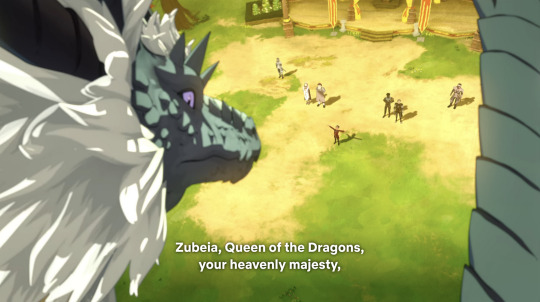
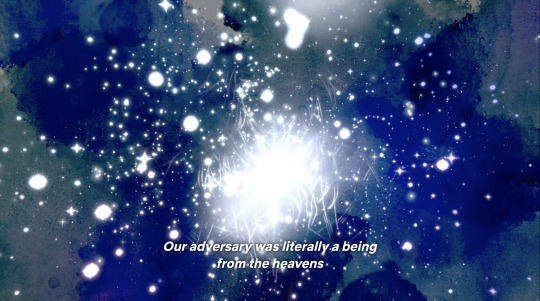
Likewise, the one person/creature we've seen referred to as a god outside the Epic of the Void poem is Avizandum by Harrow (bonus points for the game motif of "entire armies have fallen like toys" because of him):
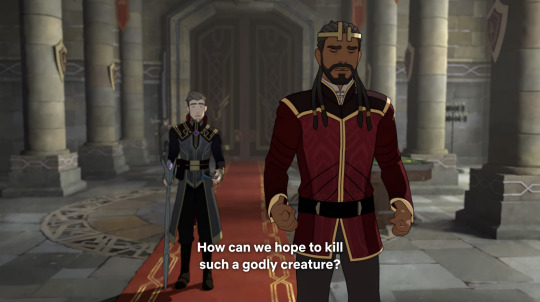
Bloodmoon Huntress also asserts that from an elven point of view (or at least Lain and Tiadrin, and presumably Runaan, too) that "Dragons are the lifeblood, the very core of Xadia" and generally assumed that dragons have the most powerful connection to their individual primal sources.
So I'd be willing to wager (esp since Sol Regem is at least 1,2000+ years old) that Archdragons at least once upon a time had been contemporaries of the First Elves if not peers. What and why that connection exists and how relevant it is for today, I don't know, but I do think there's something there, especially since the one example we have of a First Elf-Dragon relationship in Aaravos, Avizandum, and Zubeia, was perceived to be positive somewhat on all sides — a matter of trust on his end (in order to be "betrayed") and a matter of reverence and importance on theirs; "admired and loved by all" / "you meant something to him".
There is also something to be said for the Archdragons being the most powerful embodiment of the primal sources (alongside maybe some rare and noteworthy elves, like Queen Aditi) still being "unable to risk a direct confrontation" with only one singular and Fallen Startouch elf. What would a whole slew of them at the height of their power look like? (And yet it is implied that the Nova Blade is "ivory draconic" so... maybe you just have to get a First Elf close enough to the mouth to be consumed / bitten? Or perhaps the Nova Blade is made from the tooth/claw of a 'Star' arcanum dragon.)
TLDR; it's looking more and more like Startouch elves as we understand them and First Elves in generally are — while emotive and feeling the way humans and elves are — something very different from anything else we've seen thus far in terms of knowledge and power skill, and that distinction is only going to be made more and more apparent as the story goes on.
Theory #3: Where do we go from here?
So if Deep Magic is distinct from Primal, and is distinct from 2/3 kinds of Deep Magic in dark magic (derived from 5-primal and Power deep magic thoughts)... where do we go from here, magically speaking?
Well, the important thing to note is that the story has given us some thematic clues. Aaravos is concerned with exile and power, both things we see thematically most represented by human characters (with some elven exceptions like Karim and Kim'Dael). The other Star touch elves are very on brand for "Xadian exile" as their favourite punishment as well as extreme isolationism ("I knew I had to be strong alone" etc). Therefore, whatever answer we give Magically also has to reconcile these issues from a thematic and character based standpoint.
It seems like a switch of where people are concentrating energy — for Startouch elves and humans — needs to have a drastic shift to one of the other veins/concepts of deep magic that will hopefully heal the rifts. If Aaravos is Power (humans) and the others are 'Mind' (Xadian indifference/isolation and banishment) for lack of a better idea, then subverting that binary and shifting more to a third 'Love' path seems to be very on brand for TDP. Holding both at the same time but being guided by a higher principle of peace and harm reduction is what Ezran's 4x03 speech is all about, after all.
Something something both Xadia and magic and the First Elves being reunited with Xadia / humanity and elvenkind as TDP's endgame, something something.
Other Gift Giving Thoughts
The other thing I wanna talk about now that everything else is laid out is how gifts are Given, in TDP. We see time and time again relationships and magic systems being framed on the idea of whether they are giving, taking, both in a bad way or in a good way. There seems to be two main indicators for gift giving, therefore, either that in the receiver is worthy, or that the exchange is going to be reciprocal.
At its best, a gift works as intended.
Humans (and elves?) are given primal magic and generally use it for exploration and to care for themselves / one another The sun seed is given to the Sunfire elves, but they must nurture it. Callum gives Rayla her father's bow and she uses it to protect them. Callum achieves enlightenment and understanding of him and is rewarded with primal magic twice, even if the Ocean in particular is a bit murkier than he'd probably like. Gifts and belongings are relinquished or restored for freedom, for hope, for peace.
Here we have to wonder if Leola's Last Wish reconciles both the Goodbye gift motif and the gift of Magic motif, possibly resulting in the gift of the sun seed or more likely something to do with primal magic / alleviate the fallout of dark magic's consequences.
For example, to get an answer from Rex Igneous — a seeming wealth of knowledge — you have to give him a worthy gift that is also a sacrifice of some kind, according to Nath'an.
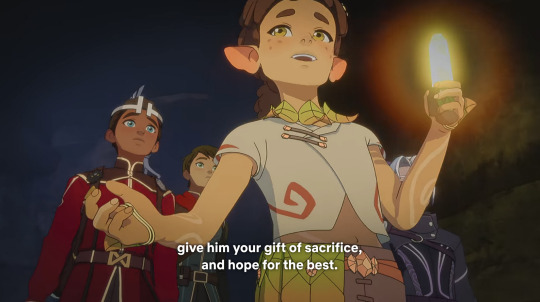
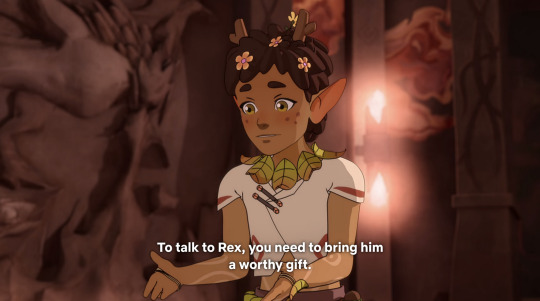
However, Ezran points out the major flaw in this line of thinking, as "We offered gifts that meant a lot to us, but the truth is, they don't mean anything to you." Not everyone is going to value the same thing or think the same thing is worth the price that was paid.
We see this interpersonally most with the mage fam ("Maybe the world would be better off without magic" from Soren, whose life was saved with it) and with Rayla and Callum (as Rayla's gift of sacrifice by leaving is something Callum did not want and rightfully did not receive well, alongside her moonstone pendant). Again: what is defined as worthy, or worthiness, is in the eye of the beholder.
Just like one of the initial thoughts that inspired this meta, Khessa asserts that dark magic is a magic that "takes" > being reciprocal for both parties, nevermind a gift. The irony, however, runs a bit deeper, as Aaravos thinks the same of his fellow stars:
But the stars kept from them one secret still: that their first lesson—patience—was not a gift of the stars at all. You see, patience is a lesson the humans taught themselves. No, the stars do not know patience, for they have no need for it. The stars want for nothing, and take all to their liking.
And we see this idea of a 'false gift' show up time and time again in the series. Nyx pretends to offer passage but actually wants to steal Zym; Rayla's act of love in leaving is a curse upon Callum's heart and wellbeing; dark magic itself is a false trade of sorts, given how unevenly it tips scales in Aaravos' favour and how much it ruins both the environment and body of its caster.
[The elven thief Lasair] never saw the precious blossoms fade and turn to cold ashes when exposed to the dawn. They never learned their gift was perceived as a curse, not a trade.
—Tales of Xadia
Kim'Dael goes to Queen Aditi under false pretences ("The Queen's Mercy") but the gift that Aditi gives her is nothing good at all:
What pretty bauble, she wondered, had she tricked the queen into forging as a token of protection? What could be powerful enough to ward away the wrath of dragons?
Just as humans sought the stars' help to protect them from the ire of the dragons, Kim'Dael sought Aditi's. And just as Aaravos offered them a false magic that would protect and ultimately trap/destroy then, so does Aditi, with magic that doesn't seem to be entirely dark or primal:
“But know this: the binding around your neck—it is made with magic not unlike your own. It is a magic that demands, that takes."
A form of magic even maybe that demands sacrifice for that kind of Power.
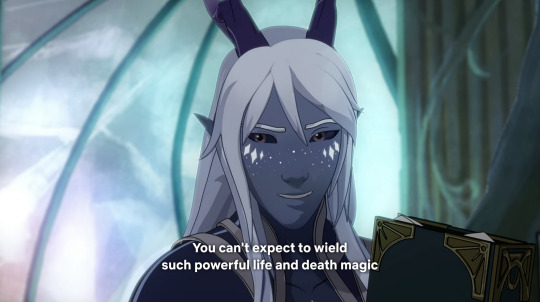
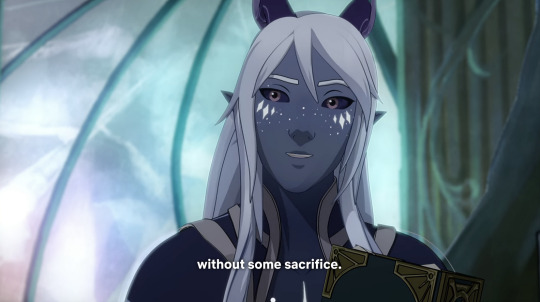
You could almost say it's something Deeper.
Conclusion
Hope you enjoyed going completely off the rails with me, and that this long (winded) post got you thinking! I'll probably do a followup discussing the implications of what we have here for potential Laurelion-Aaravos later. In the meantime, take the fruits of my labour, and spin your own hamster wheels if you'd like.
#the dragon prince#tdp#tdp meta#gift motif#dark magic#primal magic#worldbuilding#deep lore dive#i'm also pretty sure aaravos or someone got cast out bc of the primal magic thing too#stars wanted a punishment of some kind. yeah#but more on that later#something something 'but this isn't true strength. it's only power'
34 notes
·
View notes
Text
as a lifelong ATLA fan who narrowly had ATLA dethroned as my top show by The Dragon Prince steadily over the past 5 years, the similarities between the two have very little to do with the surface level parallels that get regularly drawn between them.
Like ATLA, TDP has Books for seasons and chapters for episodes, but unlike ATLA, which only touched on storytelling sparingly as a theme, TDP is obsessed with interrogating storytelling and history and the presence of unreliable, biased narrators throughout many of its episodes (most notably 2x05, 2x06, 3x06, 4x04, and 4x07 among them). Half of what you learn in the 1x01 intro ends up being a lie once you reach S3, with more being steadily deciphered.
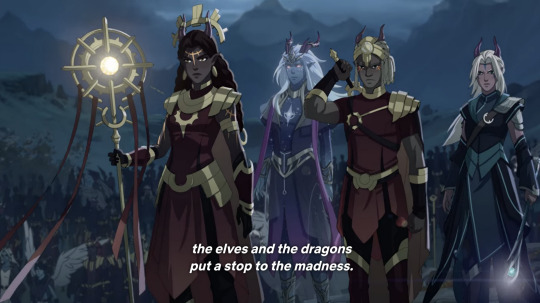
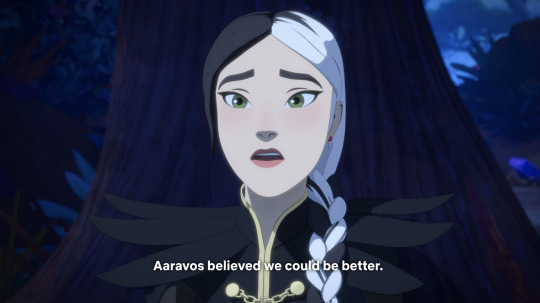
Yes, TDP has different magics with people living under those umbrella terms... for the elves. Humans are coming culturally at things from a completely different angle, and the elves' connection to their primal sources are discussed philosophically in detail, informing their practices and their culture first hand, including the way they chafe against humans, who are arcanum-less. Many animals in the world are also connected to magic, which influences both their design and which ones get hunted for humans' more 'clever' solution in dark magic, including each other.
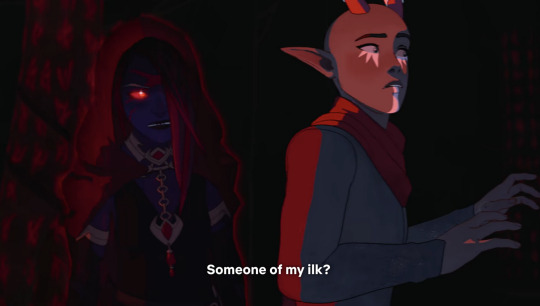
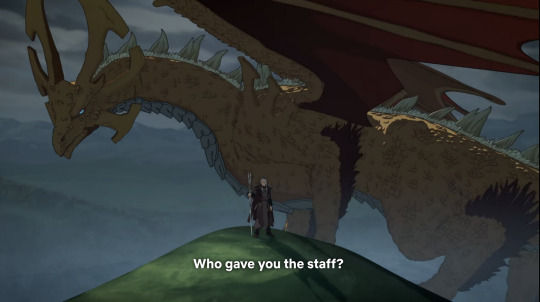
The core issue of the Puppetmaster, down to being a coercive magic formed by someone deeply resentful of their imprisonment? Said puppetmaster is the main endgame antagonist of the entire show with all of S4 onwards being exploring the ethics of controlling people against their will in various methods, and the entire show itself being a thematic battleground of fate (imprisonment) vs free will for virtually every single character.
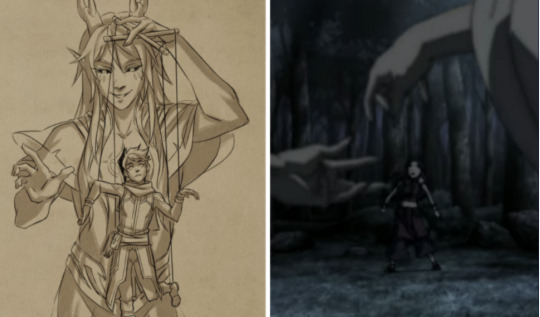
Where ATLA mostly concerns itself timeline wise with ending the war, very little thought is shown by any of the characters as to what they'll do after the war. This isn't a problem (as it reflects the sheer domineering scope of the conflict) but even Zuko being firelord is only ever really addressed with 2.5 episodes left till the finale. TDP, meanwhile, ends its 'war' in s3 and s4 opens up with dealing with the old wounds festering between people with centuries of history, the struggles that come when people aren't able to let go and believe they're safe or mourn in a healthy manner, and the religious/cultural clashes that may occur when trying to integrate different groups of people.
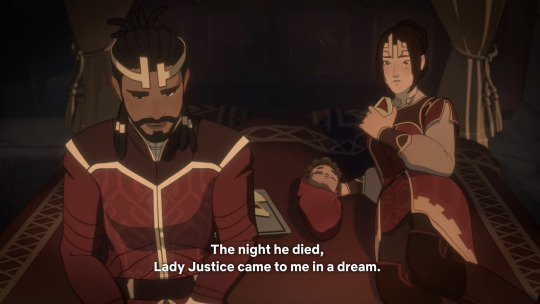
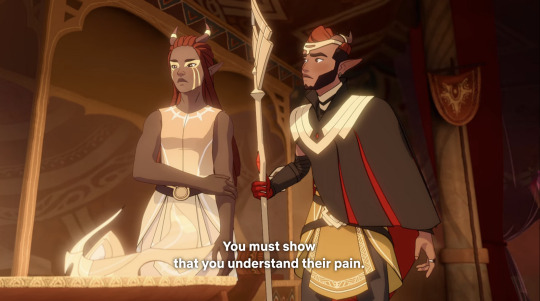
TDP also has an evil father with a devoted daughter and a brother who eventually defects, but it explores the reality of an abusive parent who loves/will sacrifice for you and your right to leave regardless, even if that means leaving the sibling you truly deeply love and who loves you in turn. Which means that when you and your sibling are on opposite sides of a deep ideological conflict, it actually really fucking hurts bc we've seen first hand just how much they love each other and also how and why everything fell apart not in spite of that love necessarily, but also because of it.
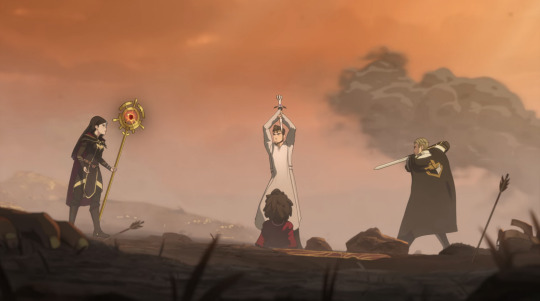
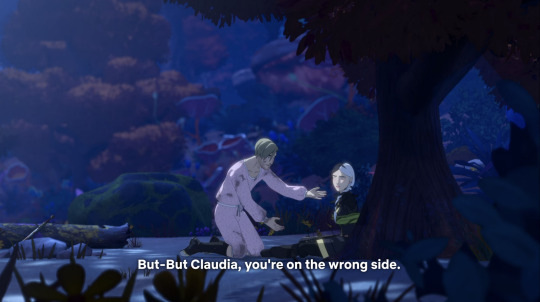
Is this to say that TDP is a 1:1 with ATLA or that it's better? No, not at all, and the latter is subjective. I prefer TDP, but I think they're about on equal ground when you look at each show currently as a whole (although TDP has two seasons left to go).
But TDP takes a lot of what ATLA was doing thematically with some of its most interesting beats and then builds or expands upon them further. It talks further and more consistently about the cycles of violence; in many ways, Jack De Sena's character, Callum, begins the series largely where Sokka had ended (and he's not the most like Sokka anyway; very much his own thing); we get Faustian bargains and centuries' long grief and fucked up people who are trying both succeeding and failing at not doing fucked up things. There are antagonists, but it is very hard to actually label anyone at this point a straight up villain. Moral greyness is where the show starts, and it just continues from there.


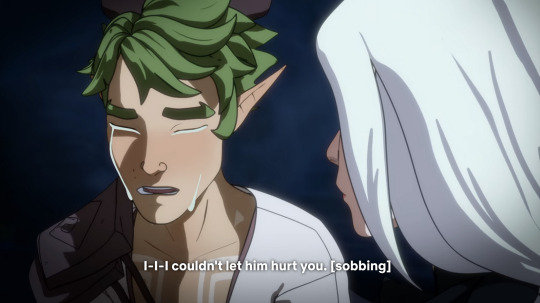
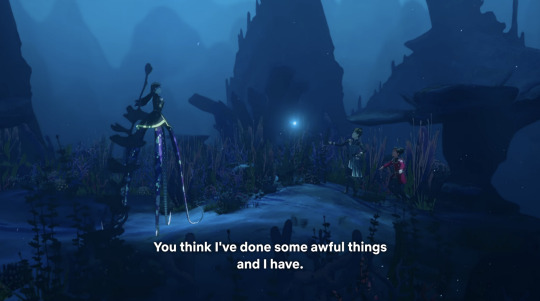
That's not to say the show is nothing but dark and depressing - like ATLA, there's a steady thread of hope and humour even as the show gets steadily closer and closer to its 11th hour point - but the show is usually emotionally heavier. There's more blood and potentially disturbing imagery with body horror and on screen death. There's so much foreshadowing you basically can't go more than 5 minutes into any episode without having something that's going to come back around or be referenced again like 3-5 seasons later.
Just to be clear - TDP is like ATLA, but it's like ATLA in interesting ways beyond the more shallow surface level that usually gets attributed to it, while still very much being its own show and its own thing. And that is why I tend to recommend it to people who like ATLA.
Thank you and goodnight
(Also, the fandom doesn't have any ship wars, and the show is queer as fuck)
#tdp#atla#the dragon prince#avatar: the last airbender#mine#parallels#analysis series#also betrayal. tdp talks a lot more about betrayal#now im trying to think if there's any character in tdp who hasn't felt or been outright betrayed#i. DON'T THINK SO??#atla meta#tdp meta
391 notes
·
View notes
Text
a lot of elves have markings under their eyes- and on their face in general.
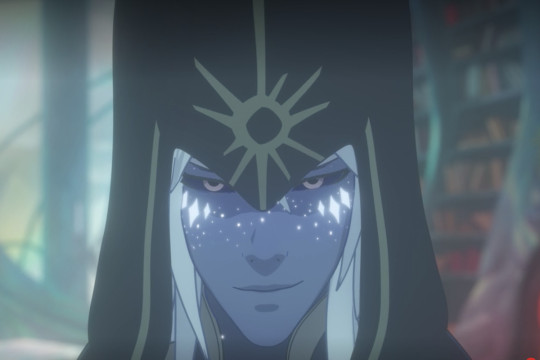
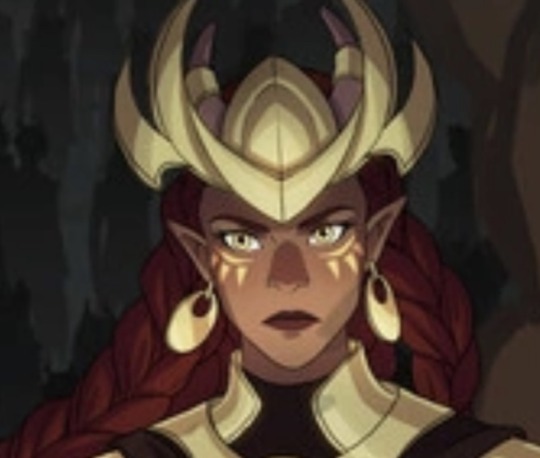
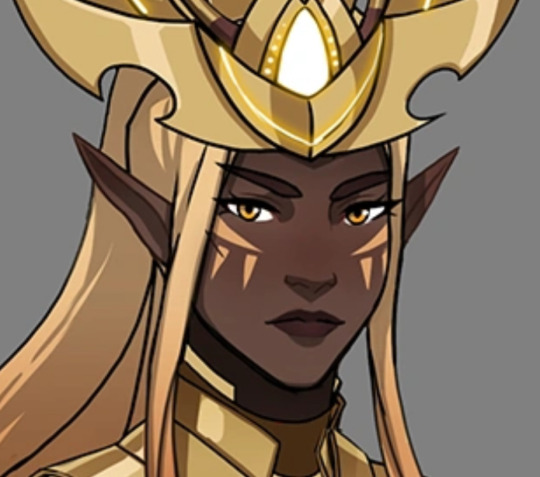
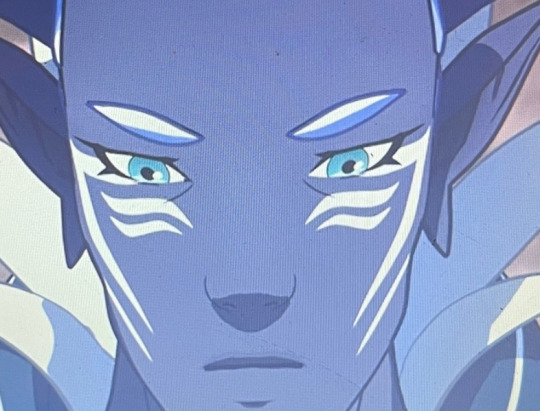
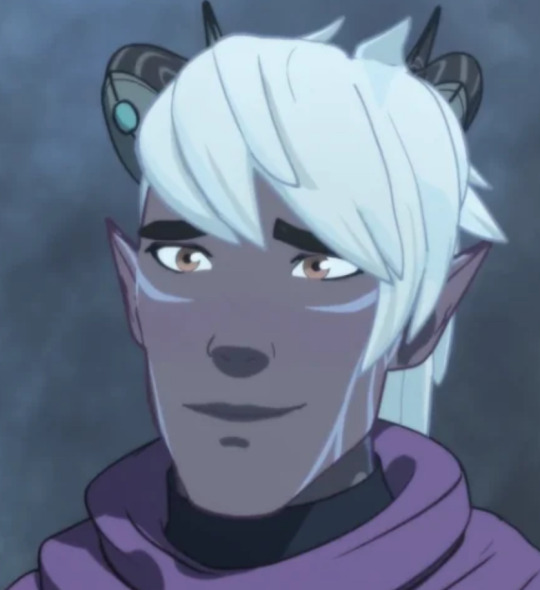
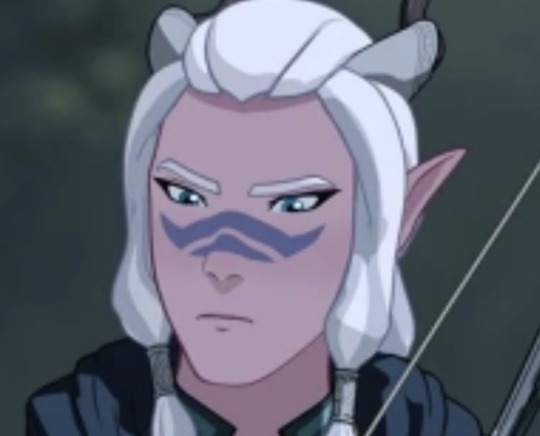

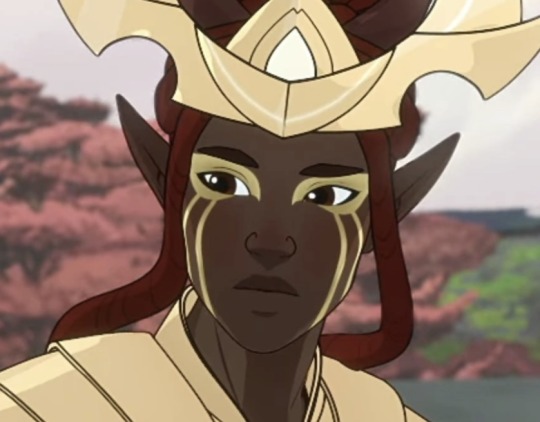

interesting, isn’t it, that dark magic does the same thing to humans?
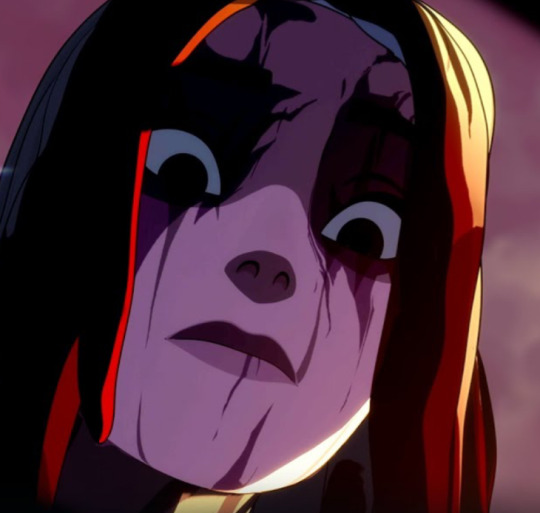

focused around the eyes :)
241 notes
·
View notes
Text
Viren really said "I will do anything for my family and the greater good" so much that his children internalized "Got it, do anything for the greater good!" and "Got it, do anything for my family!" and both dedicated themselves to their mission statements, when his own mission statement was in fact self-righteous bullshit as he increasingly just wanted power. That's kind of funny. He was lying! But they believed him because kids tend to believe their parents, and now there are twelve psychological complexes between the three of them and depending on what happens with Viren in Season Six, they might all be on different sides.
191 notes
·
View notes
Text
“At least Karim would lead the people with some sense of certainty . . .” I think it’s really interesting that Janai focused so much on Karim’s certainty in this quote back in season four, while she was agonising over whether or not to fully embrace being queen, because yes, Karim is much more certain and decisive than his sister, but we see that is actually its own weakness. While Janai often hesitates and deliberates (I loved her not being able to choose out of just two flower options, and Amaya’s exasperation; that was funny and cute) that also means that she looks deeper, thinks longer, and more often comes to better conclusions than Karim, who often just confidently charges into the wrong decisions. It feeds into this thing with the sun seed, where Janai has the patience to wait for it to grow (a metaphor for guiding her people into a new era, a different world, a more accepting world) even if it will take multiple lifetimes, and Karim does not. He takes short cuts. He cuts corners. He makes sketchy deals with forces he doesn’t understand or fully control. He might have led the people with certainty, but to no good end. Janai’s thoughtfulness is ultimately a greater strength than Karim’s certainty
#really interested to see how this little civil war between the sunfire elves plays out#the dragon prince#tdp spoilers#the dragon prince spoilers#janai#tdp janai#Karim#tdp karim#tdp meta#tdp analysis
257 notes
·
View notes
Text
Theory that Moonshadows grow out their hair when they mourn. Ethari grows out his hair after Runaan dies, Rayla grows out her hair after Runaan dies and she has been ghosted, Runaan is constantly growing his hair out in mourning of the ones he has taken...
61 notes
·
View notes
Text
We’re gonna get A LOT of Fanfiction of Rayllum staying at the “Cutesy Quaint Inn“, aren’t we?

#the dragon prince#season 5#s5#arc 2#mystery of aaravos#tdp spoilers#raylllum#tdp rayla#tdp callum#tdp#meta#tdp meta#the dragon prince meta#my own meta
290 notes
·
View notes
Text
Just can’t keep track of that pesky body count in The Dragon Prince? Don’t worry, do I have a guide for you!
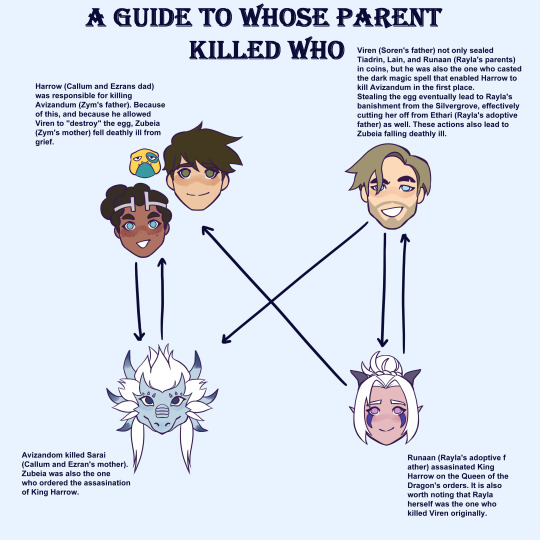
#I spent way too fucking long on this#I couldn't get it out of my head#Obviously all the death and all of the 'parents killing each other' is because of the core themes of the show#Ending the cycle and a narrative of love and all that#But it's just so funny (and sad) to lay out#These kids are a blessing#Like good on the Dragang for being friends with each other#tdp#the dragon prince#tdp memes#tdp meta#tdp art#kinda#I'm counting it I drew chibis#tdp fanart#the dragon prince art#the dragon prince fanart#art#my art#imp tag#tdp callum#tdp ezran#tdp bait#tdp zym#tdp soren#tdp rayla
1K notes
·
View notes
Text
The Dragon Prince & Queer Subtext - Fandom and Media Analysis of Sort
Lately I’ve been pondering about the ins and outs of Viren and Aaravos’s relationship and why they give off such a queer vibe. So I ended up writing this 2 and half Word document pages long little breakdown because why not.
I think what’s going on here is about the underlying elements of the story- subtext and how their relationship could be perceived through a queer lens. Note: my brain has marinated in queer subtext juices my whole life and I have no intent trying to prove my reading is the only right one.
That Sweet Sweet Gay Shit- A Fandom Perspective
There is a lot of queer subtext between them. Homoerotic subtext even. Their scenes together definitely activated the search function in my brain’s queer coded villain trope lexicon.
You know- mutual penetration with a phallic object (knife), sharing some kind of mysterious bond through blood magic, so, you know, bodily fluids are indeed involved, the classic slash fiction trope “we are close but we cannot touch” -gay pining because the mirror separates them. When Aaravos is shown for the first time in the mirror the camera does this Laura Mulvey Male Gaze 101 up-down pan shot of him from Viren’s POV. Something that’s usually reserved for female characters when male characters “check them out” in a movie. And then my personal favourite: Something that comes out of Aaravos enters Viren, comes out and then transforms into a creature with a toddler level intelligence- they made a freaky little metaphor baby together! Awwww!
And let's not even talk about the possession and Aaravos slowly taking over Viren’s body. The aesthetics of a toxic queer romance are all over their interactions.

No, Viren! Don’t express vulnerability as an intimidating male figure! Tumblr will babygirlify you!
Storytelling
So what about their interactions makes me perceive them in a queer way? By “queer“ I mean the broader concept of queer here; does the way the characters are depicted come across non-heteronormative and disruptive to gender norms.
I’m mostly talking about the season 2 here since they share their most intimate scenes together in that season.
1 Story Function
Aaravos and Viren’s interactions are supposed to have multiple purposes in the story: They move the plot forward, characterise both Viren and Aaravos, create emotional conflict and intrigue in the viewer etc. Viren observing Aaravos through the mirror is supposed to create mystery and spark the audience’s curiosity. Viren is a device through which Aaravos’s allure gets demonstrated to the viewer so of course their interactions come across pretty, hm, charged. Anyway there are layers of meaning here the audience can interpret in multiple ways both intuitively and through an analytic lens. The meaning naturally changes the more context we get. There are still three more seasons to come.
2 Gendered Tropes
There is a certain element of seduction present: Viren gives Aaravos more access to himself and his body little by little in exchange for Aaravos fulfilling his desires (for power). This could be read as having sexual undertones. Some of Aaravos’s first words to Viren are clearly something Viren wants to hear “How may I serve you?” Weaponising manipulation and seduction, where a character poses as submissive while having alternative motives, is something female characters traditionally do in stories. I don’t know about you but Aaravos’s character has a bit of a femme fatale thing going on if you ask me (haha!) There is something about him that defies gender roles that’s not just about his androgynous looks.
A traditional Femme fatale is often a tragic figure trapped in unfortunate circumstances. They are shrouded in mystery which prevents the audience from empathising with them or understanding their motives. The character often uses coercion to make their victim do what they want. And yes there definitely is an element of coercion and even a threat of violence present in Aaravos and Viren’s relationship. Their goals are aligned for now but what happens if/ when Viren decides to defy Aaravos? TDP makes me wonder (with horror) what it is that Viren has really agreed to.
3 How the Show’s “Camera” Portrays Aaravos
Even the camera emphasises him as an object of desire. Something he is from the story point of view as well. Viren desires access to Aaravos’s power after all. When the camera puts Aaravos on display in an objectified manner in the beginning of the season 2 it’s supposed to, in my opinion, heighten the feeling of Aaravos seeming harmless at the first glance. And by “objectified” I mean he’s portrayed without agency.
I joked earlier about male gaze and Laura Mulvey but I do actually think there is some truth to that. One of the biggest reasons behind me thinking Aaravos was a pretty pretty lady at first was how he was introduced in such a feminised way. And I wasn’t the only one. Just look at the comments under his TDP Wiki article. (Lots of het men being confused about their sexuality. Also shout-out to that one lesbian). This makes him appear less threatening so the story can build suspense around his true motives. It’s not evident that Aaravos is a completely sinister figure at first, at least compared to Viren who seems more like the main villain of the story prior to the seasons 3-4. Little did we know back then that Aaravos was the true alpha male of this whole sordid affair.

Aaravos in the mirror from Viren’s point of view, season 2, episode 3.
Why I’m not mentioning anything about Viren’s gender performance is because his story conflict is all about struggling with traditionally masculine gender expectations. Understanding how his character relates to hegemonic/ toxic masculinity/ emotional struggles men face in real life is a core part of understanding his character as a whole. That’s a broad topic and this post is long enough as it is so I’m going to leave it at that. (Maybe someone else has written about that already?)
4 The Audience Is Also at Aaravos’s Mercy
Aaravos’s submissive façade is supposed to fool both Viren AND the audience. The show plays rather cleverly with the audience’s expectations here. Slowly the roles are starting to flip until it’s clear that Aaravos is the one in control. Given Aaravos narrates the opening of the first story arc it raises even more questions: Is his control over Viren supposed to parallel his control over the whole world of the show? This circles back to the show’s themes of freedom vs destiny. It feels almost meta in a way how the story’s villain tries to gain control over the whole narrative.
5 Horror and Fantasy
The powerplay between the characters naturally creates a plenty of tension and it’s not unusual that this translates into something sexually charged in the audience’s minds. While this is the perspective I’m the most interested in, there are other layers to Aaravos and Viren’s scenes together.
For example this kind of breaking of bodily boundaries is common in horror as well. Aaravos is beautiful and mysterious but is also associated with repulsive things like larvae and blood and there is something very eerie about him in general. These kinds of emotional reactions of repulsion and attraction are essential to horror. The audience sees that everything isn’t definitely quite right about him but it’s also understandable that the audience (and Viren) find him fascinating. I think the key word for these scenes in the season 2 is “ambiguity“. Even if you aren’t invested in these characters this show would be much less fun without all the nuance their interactions have.
In a good story everything isn’t just literal. Especially since TDP is a fantasy story- A genre that’s traditionally been all about symbolism and intertextual references. I could go on and on about the genre traditions with similar flavour to what Aaravos and Viren have. Michael Moorcock’s classic sword and sorcery antihero Elric of Melniboné and his pact with the demon Arioch comes to mind.
Something Something Fandom
Viravos as a ship lives in the subtext but the subtext isn’t always black and white. Fiction uses metaphor and other storytelling methods to create meaning- To give a narrative experience. The queer subtext in TDP feels very elaborate to me and while I’m dissecting these scenes more analytically here my emotional reactions are the original source of that interest. No matter how much time passes I’m still a morbid teenage goth at heart and that part of me loves the dark fairytale aesthetics akin to TDP season 2.
I didn’t even touch on the element of Viren giving into a “forbidden desire” (literally his desire for power but- you know- multiple readings etc.) when making a deal with Aaravos. Something very typical to the horror genre as well. It’s a “deal with the devil” -sort of situation and those stories often paint the agreement as something corruptive and sinful and therefore transgressive. This post by Tiredsunrisesmeta got you covered on that. Also queer coded villains something something- Anyway, read Tiredsunrisesmeta’s blog for more.

Pictured: Yours truly
Last and Least
I remember when I saw a post here saying that “Viravos couldn’t be canon because it’d be too sexy.” and that’s just the funniest way to put it in my opinion. Their relationship feels a bit too, I dunno, mature? for this show. But what does “canon” even mean? Is a gay ship canon when two characters of the same gender kiss and declare their love? Get married? Have kids? Personally, I don’t want to see LGBT+ characters’ stories just copy straight romance tropes beat by beat all the time. I want something that feels authentic and what’s more authentic than Viren being a cringefail bisexual getting rejected by men and women and then getting his life ruined by the sexy femboy elf satan? Kinda iconic honestly.
#thanks for the canon mpreg tdp#viravos#tdp viren#viren#tdp aaravos#sarasade text#the dragon prince meta#tdp meta
226 notes
·
View notes
Text
Let's Talk About the Breakfast Guards!
Are they a couple? Was it just a brief thing? Or did some of us hallucinate the whole thing altogether?
We fist meet them in Book 1 Episode 2: What is Done.
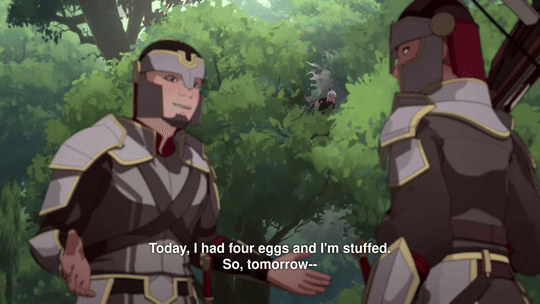
They're a bit out of focus, but we can see some distinguishing details: the guy's beard and that the woman has blond hair and green eyes. I think she also has a braid under the helmet flap.


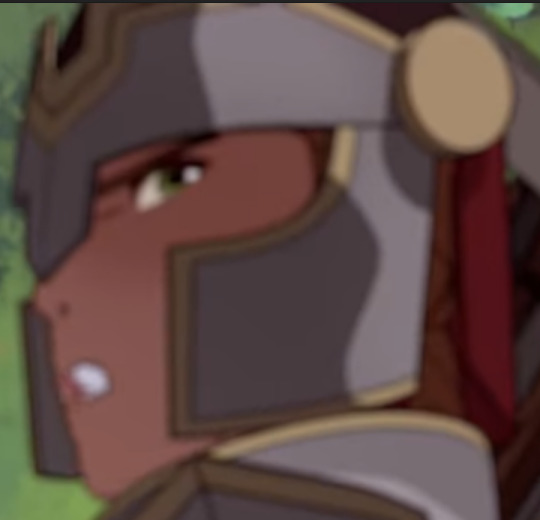
Also, I think they're voiced by Jason Simpson (Viren and Barius' voice actor) and Paula Burrows (Rayla and Opeli's voice actor).
The next time we see them again is 2 years later, in Book 4 Episode 3: Breathtaking. It looked like they were about to kiss! At least I think it's them

The guy is definitely the same, at least the same model. The woman's eyes look blue here. She's also got blond hair and has a braid, though here the braid is out.

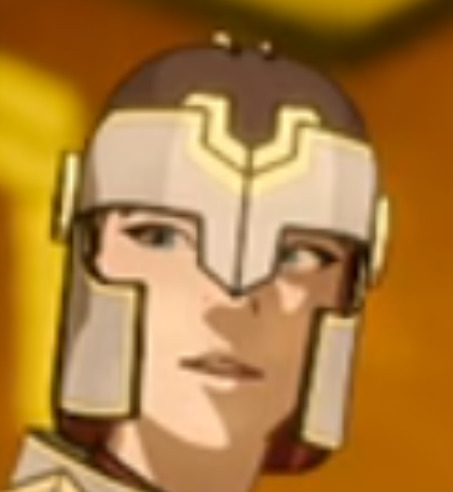

They don't have any speaking lines.
The last time we see them so far is in Book 5 Episode 7: Sea Legs. They're stationed outside Lux Aurea and the guy seems to be flirting with a Sunfire Elf guard! The human woman guard looks annoyed.

We know this is the same breakfast guard. He's even referred to as such in the subtitles. But is the other human the same woman as before? She's blond and seems to have a braid but her ayes are definitely blue.

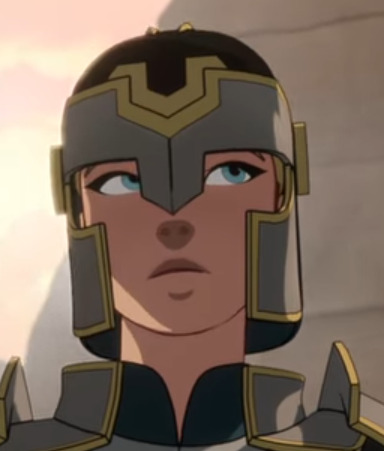
I do hope it's them each time and that we'll see them in the future. We only have 18 episodes left so probably at the end of the show but I would love a resolution for them 🤭
58 notes
·
View notes
Text
anyway one thing i think TDP does very very well is how it uses visual storytelling so strongly to indicate character mindset(s) and progression
Claudia's hair is the most obvious example - we don't need to be told she did something fucked up in 3x09 to bring her father back, because as soon as we see more white hair we know, from context and worldbuilding clues, that she did. It allows a lot to be communicated but not directly told, and it carries weight accordingly
Then there's more subtle ones - the sun being behind Janai when she steps up behind the horn ruins vs Karim not having one, because she is the true and fair queen and he is not, as well as her being right in how she handles matters legally and him being wrong in how he handles matters (il)legally.
There are also examples of Rayla's S1 binding - she's literally uneven/unsymmetrical and subsequently off-kilter - as a chain she has to be freed from, and how Callum has the golden bars around his wrists in his arc 2 design that also look like he's wearing permanent quasi-chains (because of course he is)
The crown of Katolis is a literally broken circle/chain, Aaravos walking around being literally heartless, how certain spells appear and a perpetual emphasis on circles (people being surrounded, objects, etc.)
There's a lot being communicated and is one of the reasons, I think, the show is so rich because our brains take it in subconsciously if nothing else, and then we can notice it more consciously on rewatches and subsequently appreciate it, and it just adds to how many layers are on screen at any given time
#tdp#the dragon prince#mini meta#appreciation#mine#text post#tdp meta#callum's character design in general i.e. being the only one not predominantly in red in the royal fam#indicating that 1) he feels kind of out of place and 2) blue is a passive/less exuberant colour#and esp in s1 he's a lot more doubtful/worrier than ezran#meanwhile in arc 2 all the kids (most evidently him and ez) have outfits that mirror their 'parental generational foil'#callum gets viren ez gets harrow and rayla gets runaan (now reinforced by her having the bow)
231 notes
·
View notes
Text
i love harrow and viren they're so fucking awful. like harrow's over here going "i have been reflecting and decided to choose peace and kindness. except for in my relationship with you. there i'm choosing violence because the anger's gotta go somewhere <3" and viren's like "but i LOVE YOU! i'm like this for you!" and harrow's like "i did not ask you to do that (i let you do it tho for a very long time)" and viren's like "but i'm your right hand arm-man. your everything. your confidant. your best friend. your silly rabbit" and harrow's like "i have never once called you that"
177 notes
·
View notes
Text
ok so i always wondered why the star in the mystery of aaravos intro looked the way it does instead of just a regular 4 prong star?
like this, yk:
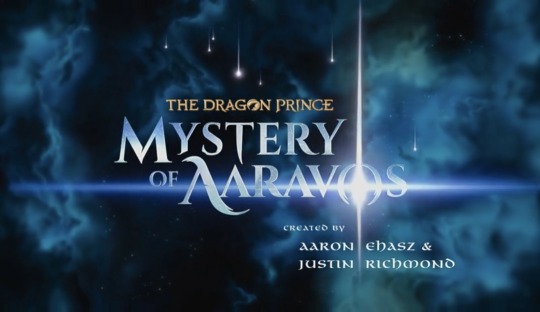

and then i was looking at it and. i was like OH

it’s because it’s supposed to be the nova-blade.
it was there all along, since s4 and it will be until s7.
yk, the novablade, that thing that’s maybe gonna kill aaravos! a weapon used against him OR by him to make the other stars fall! like they are on screen! at the literal core of the mystery of aaravos!
they can’t just do that to us
#novablade#tdp meta#the dragon prince#tdp arc 2#arc 2#more novablade posting#yk how it is#i think every day i fall a little more in love with this show#self spaghettification#banger#mine
167 notes
·
View notes
Text
I can’t wait to see Ezran’s reaction to Callum wanting to free Runaan, and then Runaan himself. We all know that he’s a kind, wise kid. He strives for peace, sees the best in people, prefers diplomacy over combat and applies respect and compassion to everyone he meets. He'd rather show mercy than take prisoners. He wants to avoid his father's mistakes of pursuing hatred and escalating conflict. His power is literally enhanced communication. Compared to the much more ruthless Prince Callum "Stab, stab, bye-bye, bad guy!" of Katolis, he seems pretty 'pure of heart'.
But he has anger inside him. He resents the pain and injustice he's experienced and holds grudges, like Harrow before him. He admits to his people that he is learning to forgive and move forward alongside them. And it isn’t easy.
"We are angry! I am angry. I have been hurt. ...We all want peace and we all want love, but violence tests us. In a twisted way, it converts us to its cause. Because pain and loss feel so terrible inside, you want to hate, you want to hurt someone else."
Callum would kill to save his loved ones, but not to avenge them. One of the first things he does in the show is condemn the self-perpetuating cycle of revenge as irrational, unhelpful and needlessly destructive. He forgives Rayla and Soren. He jumps on board with liberating Runaan, his father's killer, because it's what Rayla wants, even though she's actually willing to put it aside for now. When she steals Runaan's bow he used to commit the crime, he exhibits no hard feelings.
But when Ezran finds the arrow Runaan fired to inform the Dragon Queen of Harrow's death, he breaks it out of rage and spite.
So when he discovers that his dear brother is trying to free the man who murdered their father and stole his childhood, to allow him to experience life and be with his loved ones when Harrow can't? He's not gonna like it.
This arc seems wonderfully plausible in Season Six becaues this franchise adores its parallels and foil dynamics, and Claudia's most likely motivation in Season Six is "The heroes killed my dad and I'm going to make it everyone's problem!" It's telling that his speech about the cycle of pain, bitterness and vengeance I quoted is layered over Claudia fighting in the name of her own murdered father.
The beautiful symbolism of Ezran having his crown forged from the steel of Harrow’s sword... on one hand, he's destroyed a weapon because he never wants to use it. He's choosing a narrative of love over a narrative of violent strength. But on the other hand, he carries the weight of his murdered father's weapon, which did spill blood and take lives, with him all the time as a symbol of his identity, specifically his identity as a powerful authority figure and Harrow’s successor. You see how that’s a little troubling, right? In a show so concerned with generational trauma and history repeating? Ezran? Are you okay?
#he is NOT and i want to see him be messy about it#tdp ezran#king ezran#the dragon prince#tdp#tdp meta
72 notes
·
View notes
Text
I love how (with the exception of possession) this show really goes out of its way to say that every time a character says some variation of the “I had no choice” it’s not true: you do have a choice, you always have a choice, you chose to do that. Soren’s “I . . . I had no choice” when he stabs the illusion of his father. He had a choice, and he chose not to let his father stab a child to death. A very fair choice, I don’t think many would argue that one. He chose Ezran. Then Terry’s “I-I had to. I couldn’t let him hurt you.” He chose Claudia. Viren’s “every step I took I took because I had to” which is rebutted by his own self “no matter where you are on the path, no matter what you’ve done before, every step forward is a choice.” And Callum’s “I had to, to save my friends.” Does doing bad things inherently make you a bad person? If you justify the doing of the bad things to yourself, because you had to, does that make it easier to do more of them in the future? And if you allow a bad thing to happen because you did nothing, what does that make you then? It’s why Finnegrin’s is it such a big deal dirtying yourself with a little dark magic? hit’s Callum so hard, because it’s a question that’s probably been on his mind before. Even if the alternative is inconceivable, the choice is still there, has still been made. Exploring that is so wonderfully fascinating
#the dragon prince#tdp meta#sorry this was just a splurge of my thoughts#as always just my personal interpretation#tdp Callum#tdp soren#tdp Terry#tdp viren
293 notes
·
View notes
Text
Is Redfeather Etharis mother?
I just read the new short story about Rayla in Scumport, where we were introduced to this wonderful new MILF character, Redfeather:
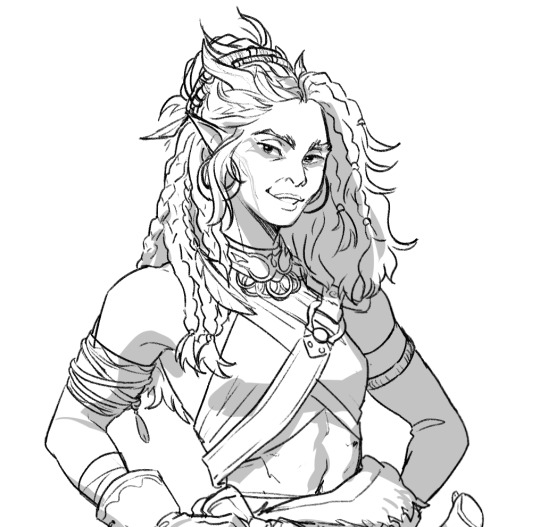
Some things we learned about her:
She’s a moonshadow elf
She has matted messy hair
She has pale markings and likely has a darker complexion (“like shining leather”)
She was ghosted about 15+ years ago
She doesn’t regret the thing(s) she was ghosted for
Now 15+ years ago doesn’t place her at any important events that we know of yet. Rayla would’ve been 0-2 years old at the time, so it probably doesn’t connect to her. The whole ordeal with Sarai getting killed by Avizandum happened about 10-12 years prior, so it couldn’t be connected to that.
But you know who would’ve been in a very interesting age back then?
Ethari and Runaan
Ethari and Runaan were once referred to as “uncle-ish” age, which the show runners have clarified means somewhere between 30-35 years old. That means Ethari and Runaan would’ve been 15-20 years old at the time when Redfeather got ghosted by her village. And as we all know, 15-20 is the perfect age for fictional characters to get traumatized✨
One theory I had was that she was somehow involved with the assassins (target? Former assassin? Who knows) and that her crime, which somehow affected a younger Runaan, got her ghosted. But that is a theory for another time.
What caught my attention first was the specifics of her description.
Pale markings and “leather colored”(darker) skin
When it comes to the colors of markings, moonshadow elves tend to have very deep or even dark blue/purple markings. Ethari is the only moonshadow elf we’ve encountered till now who has significantly lighter, or paler, lavender colored markings amongst moonshadow elves.
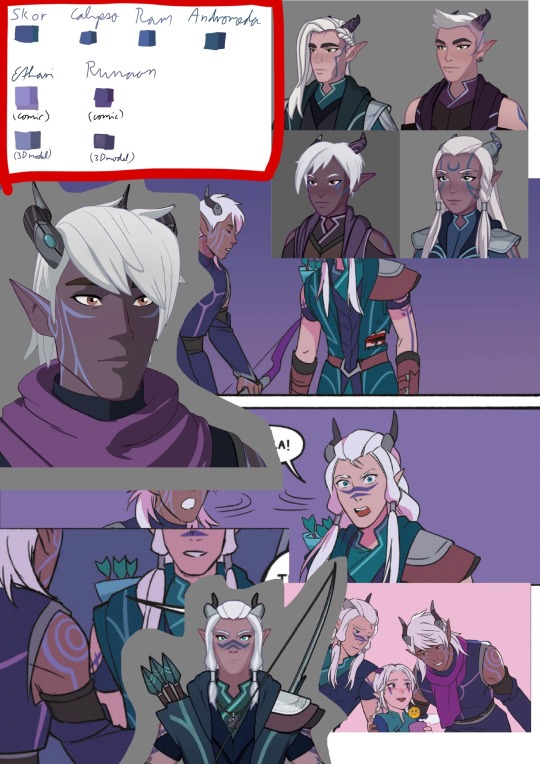
This means that Redfeather having specifically PALE markings would be significant, if the paleness is referring to the color.
Another point is the eyes
While Redfeathers and Etharis face’s aren’t THAT similar, the eyes very much ARE
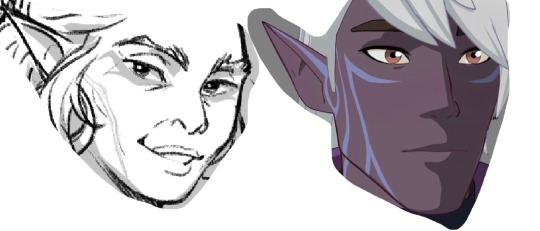

Look at that shape! Look at the lashes! Look at the curved lower lids! If this doesn’t mean anything, then this would be one heck of a coincidence for eyes to be drawn THAT similarly.
Another reason I like this theory isn’t just because of looks and appearances, but also because it could explain a bit about Etharis behavior regarding ghosting family members and strong feelings about abandonment.
See, when Rayla first comes back to the Silvergrove, one of the first things he says to is:
“They’re gone Rayla. He’s gone. Because you abandoned them.”
And later on, when he briefly lifted the ghosting spell to talk to Rayla, he says again:
“But I don’t understand, how could you abandon them like that?”
On a similar note, in the novel the bloodmoon huntress, when Runaan realizes that Kim’Dael is out there, there isn’t even a question about wether or not Ethari is coming along; he said right away “I’m coming with you”. He was NOT gonna stay- or be left behind. It’s like he has some very deep rooted issues surrounding abandonment, and being left behind. Maybe because his mother had to leave him when he was young? Or maybe pertaining to the crime she committed, where she left someone behind and surrendered them to their doom? Who knows…
And yet, for someone who has such strong feelings about someone being left behind, he was very quick to ghost Rayla. Yes he regrets it, and yes it was a decision made with feelings and grief and not his sound and sensible mind. But regardless of how much he regrets it now, he still ghosted her for “abandoning her team (and Runaan)”, and he seemed very sure of that choice at first.
If we looked at him as a regular person, a godfather who loved and cherished his goddaughter, and had raised her since the age of 8, this behavior doesn’t make any sense!
But if we look at him as someone who’s had to do it before, someone who had to learn long ago that family ties don’t excuse crimes, and that sometimes you need to cut out and ghost those closest to you - like say, your own mother-, well then it makes sense why he was able to do that to his goddaughter, even if he regretted it later…
——
And a final point close this whole theory off, though it is more of a meta textual point:
Ethari rarely gets talked about by the creators of the show. He was maybe mentioned here and there in the past, and on Twitter Aaron Ehazs promised that they hadn’t forgotten about Ruthari. So any mention of him that actually includes his name and something other than „he’s Runaans husband/Raylas substitute dad“ is pretty special and rare to find outside of the graphic novel Bloodmoon huntress . But in this new short story, he wasn’t just mentioned by name; he was specifically described along with his profession, his crafting.
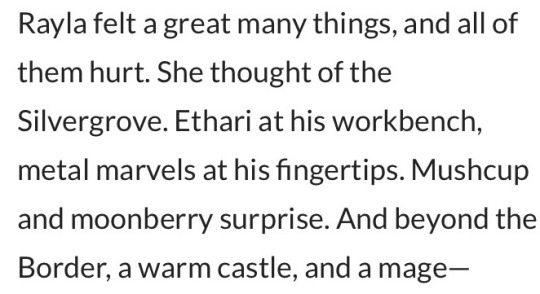
And the first time that Ethari gets mentioned again outside of the bloodmoon huntress is when a new Moonshadow elf with eyes almost identical to his gets introduced.
~~~~~~~~~~~~~~~~~~~~~~~~~~~
✨Thanks for reading!✨
Feel free to add your own thoughts to this theory in the comments or in reblogs!
@beautifulterriblequeen @sunstone-nerding @hoothalcyon @legend-of-the-fandoms @anybody-else-who-wants-to-join-the-fun
#tdp#the dragon prince#tdp theory#tdp headcanons#tdp ethari#tdp Redfeather#tdp season 5#tdp s5#tdp spoilers#tdp meta#tdp angst ✨#tdp speculation#tdp rayla#tdp runaan
156 notes
·
View notes